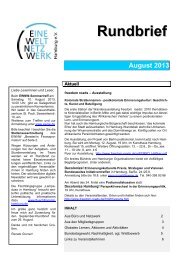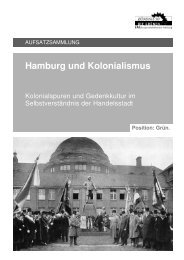environmental, human rights care and gender organisation
environmental, human rights care and gender organisation
environmental, human rights care and gender organisation
You also want an ePaper? Increase the reach of your titles
YUMPU automatically turns print PDFs into web optimized ePapers that Google loves.
ENVIRONMENTAL, HUMAN RIGHTS CARE AND<br />
GENDER ORGANISATION<br />
LAND RIGHTS IN BAGAMOYO DISTRICT<br />
By<br />
Abdallah Ramadhani<br />
NOVEMBER 2010
About Enviro<strong>care</strong><br />
Who are we?<br />
Enviro<strong>care</strong> (Environmental, Human Rights Care <strong>and</strong> Gender) is a<br />
local non-governmental <strong>and</strong> non-profit making organization, which<br />
was established <strong>and</strong> registered in 1993 under the Trust Deed Reg.<br />
No. 3060.<br />
The organization is actively involved in the promotion <strong>and</strong><br />
protection of <strong>environmental</strong> conservation, <strong>human</strong> <strong>rights</strong>, <strong>gender</strong><br />
equality <strong>and</strong> wealth creation in various parts of Tanzania.
Enviro<strong>care</strong> vision <strong>and</strong> mission<br />
• Vision<br />
– Enviro<strong>care</strong> vision is to see<br />
a society with a clean <strong>and</strong><br />
safe environment that can<br />
benefit all citizens equally<br />
<strong>and</strong> in a sustainable way.<br />
• Mission<br />
– promote <strong>and</strong> support<br />
<strong>environmental</strong><br />
conservation <strong>and</strong><br />
livelihood with a<br />
<strong>gender</strong>, <strong>human</strong> <strong>rights</strong><br />
based approach
About Tanzania<br />
• Tanzania is located in Eastern Africa<br />
• It boarders Indian Ocean to the east, Ug<strong>and</strong>a<br />
<strong>and</strong> Kenya to the North, Burundi, Rw<strong>and</strong>a <strong>and</strong><br />
DRC to the West <strong>and</strong> Mozambique, Zambia <strong>and</strong><br />
Malawi to the South.<br />
• It has a total area of 945,087km 2 of which<br />
59,059km 2 are covered with water <strong>and</strong><br />
886,037km 2 are dry l<strong>and</strong>s.<br />
• In 2008 the country was estimated to have a<br />
population of 40,213,160 at a population growth<br />
rate of 2.072 percent.
Arable l<strong>and</strong> <strong>and</strong> l<strong>and</strong> cultivation<br />
• The Tanzania<br />
Investment Centre<br />
estimates that, at<br />
present, Tanzania<br />
has about 44 million<br />
ha of arable l<strong>and</strong>, yet<br />
only 10.2 million ha is<br />
currently under<br />
cultivation<br />
L<strong>and</strong> use (millions of<br />
hectares)<br />
Total usable l<strong>and</strong> 94.5<br />
Arable l<strong>and</strong> 44.0<br />
L<strong>and</strong> under<br />
cultivation<br />
Area suitable for<br />
irrigation<br />
10.2<br />
29.4
Arable l<strong>and</strong> <strong>and</strong> l<strong>and</strong> cultivation<br />
cont’<br />
• Tanzania has extensive areas of l<strong>and</strong><br />
characterised by :-<br />
– low levels of rainfall <strong>and</strong>/or<br />
– poor soil fertility,<br />
• This l<strong>and</strong> supports relatively low <strong>human</strong><br />
population densities <strong>and</strong> low-intensity l<strong>and</strong><br />
uses such as pastoralism <strong>and</strong> shifting<br />
cultivation
L<strong>and</strong> grabbing for investments<br />
• Tanzania has been experiencing a<br />
rapid increase in biofuel investment<br />
proposals <strong>and</strong> production in recent<br />
years<br />
• Also, plantations for carbon credit <strong>and</strong><br />
timber harvest are on the increase
Justification for l<strong>and</strong> grabbing for<br />
biofuels <strong>and</strong> timber plantations<br />
Promotion of biofuels have started in Tanzania with ambitious focus to:<br />
Improve energy security (e.g. reducing oil imports <strong>and</strong> foreign exchange<br />
savings);<br />
According to BoT (2006), the value of the country’s oil imports increased<br />
from US$400.3 million (2003) to US$ 1.1 billion (2005),<br />
Dem<strong>and</strong> <strong>and</strong> price for petroleum products are growing rapidly at a rate of<br />
more than 30 percent per year (GTZ, 2005) causing a heavy burden for the<br />
country.
Justification for l<strong>and</strong> grabbing for<br />
biofuels <strong>and</strong> timber plantations cont’<br />
• Mitigation of climate change:<br />
– However, clearing of forests <strong>and</strong> conversion of peat<br />
l<strong>and</strong>s <strong>and</strong> grassl<strong>and</strong>s for biofuels plantation is taking<br />
place<br />
• Rural development<br />
– Priority is not on locally owned production for local/<br />
regional consumption<br />
– Priority on agricultural / farming practise with highest<br />
job creation potential <strong>and</strong> quality of work is not<br />
happening instead agro-industrial farming which<br />
makes farm worker either redundant or sick<br />
• Export development:<br />
• develop new export markets <strong>and</strong> improve the trade balance.
Biofuels development in Tanzania<br />
• Currently, the biofuel industry is underdeveloped<br />
<strong>and</strong> highly speculative<br />
• Over 4 million hectares of l<strong>and</strong> have been<br />
requested for biofuel investments, particularly for<br />
jatropha, sugar cane <strong>and</strong> oil palm.<br />
• But only 640,000 ha have so far been allocated<br />
– <strong>and</strong> of these,<br />
• only 100,000 ha have been granted formal <strong>rights</strong><br />
of occupancy.
Biofuels Companies<br />
• Total of 44 companies are engaged in<br />
production of biofuels in Tanzania<br />
• Some companies have already acquired<br />
l<strong>and</strong> for growing biofuel feedstocks<br />
• others are in the preliminary stages of<br />
acquiring l<strong>and</strong> or<br />
• seeking for government approval to start<br />
producing biofuels
Some of the biofuels companies<br />
Investor Crop Location L<strong>and</strong> area<br />
acquired<br />
(ha)<br />
L<strong>and</strong> area<br />
originally<br />
requested (ha)<br />
Project status<br />
BioShape Jatropha Kilwa 32,000 80,000 400 ha pilot farm<br />
planted.<br />
Sun Biofuel Jatropha Kisarawe 8,211 50,000 L<strong>and</strong> transferred to general<br />
SEKAB BT<br />
(Eco –<br />
Energy)<br />
SEKAB BT<br />
(Eco –<br />
Energy)<br />
Sugarcane Bagamoyo<br />
(RAZABA)<br />
l<strong>and</strong>; derivative title<br />
being finalised<br />
22,500 24,500 Seed cane planted <strong>and</strong><br />
irrigation reservoir<br />
constructed<br />
Sugarcane Rufiji 0 400,000 In l<strong>and</strong> acquisition process<br />
Prokon BV Jatropha Mp<strong>and</strong>a 10,000 n/a Contract farming with 2000<br />
smallholder farmers<br />
African<br />
Green Oils<br />
Paolm oil Rufiji 860 n/a Planted 360 ha <strong>and</strong><br />
financing l<strong>and</strong> use plans<br />
in 7 villages
Location of Biofuels investment<br />
Jatropha<br />
curcas<br />
Palm Oil<br />
Sunflower<br />
(Special seed<br />
from Japan)<br />
Croton<br />
Microstachys<br />
Sugarcane<br />
(Areas with sugarcane<br />
plantation for sugar<br />
production)<br />
Sweet sorghum
Location of biofuels investment<br />
• Biofuel production is<br />
particularly favourable<br />
along the coast for<br />
several reasons.<br />
– First, proximity to the coast<br />
can facilitate exporting of<br />
produce.<br />
– Second, coastal areas tend<br />
to have relatively high<br />
levels of rainfall <strong>and</strong> water<br />
for irrigation from rivers<br />
flowing to the sea.<br />
cont’
Policy environment for biofuels<br />
production<br />
• There is no policy to guide the biofuels<br />
investment in Tanzania<br />
• In the absence of a biofuels policy, the govt. was<br />
in a situation where it had to borrow patches of<br />
clauses from various policies.<br />
• Have clauses which promote utilization of<br />
sustainable or renewable energy sources but<br />
are not specific to biofuels<br />
• The National Biofuels Task Force has been<br />
formed to review <strong>and</strong> develop a policy <strong>and</strong><br />
regulatory framework.
L<strong>and</strong> grabbing for Carbon credit<br />
• Green Resources Limited<br />
(GRL) (a Norwegian investor)<br />
is now acquiring huge l<strong>and</strong><br />
areas in Tanzania<br />
• Has started planting fastgrowing<br />
trees that will fix CO2<br />
from the atmosphere<br />
• It is hoping to be issued with<br />
Certified Emission Reductions<br />
(CERs) by the CDM Executive<br />
Board in order to earn income<br />
from the sale of carbon credits<br />
project
Amount of l<strong>and</strong> grabbed<br />
Number Village L<strong>and</strong><br />
grabbed<br />
1 Uchindile 12,000 ha<br />
Future<br />
plans<br />
2 Map<strong>and</strong>a 6,258ha 6,900 ha<br />
3 Idete 11,663 ha 0ha<br />
47,000 ha<br />
in Kitete<br />
village
L<strong>and</strong> grabbing for carbon credit cont’
L<strong>and</strong> acquisition Processes<br />
• Through Tanzania Investment Center<br />
– The investor introduces the business idea to the TIC; after fulfilling all<br />
the requirements at the TIC, such as business registration <strong>and</strong><br />
verification of investment capital, the investor is given a ‘Certificate of<br />
Incentives’.<br />
– The investor then goes to a district where there is an appropriate<br />
quantity <strong>and</strong> type of l<strong>and</strong> in order to carry out a formal l<strong>and</strong> survey.<br />
– The surveyed l<strong>and</strong> is registered at the Ministry of L<strong>and</strong>s, Housing <strong>and</strong><br />
Human Settlements Development.<br />
– The investor’s agricultural project is registered <strong>and</strong> approved by the<br />
Ministry of Agriculture.<br />
– The investor applies for a derivative right of occupancy from the TIC.
L<strong>and</strong> acquisition village<br />
• Through village<br />
– The investor identifies the village where there is potential l<strong>and</strong><br />
that he/she wishes to acquire.<br />
– The investor meets the Village Council to seek approval of the<br />
request for l<strong>and</strong><br />
– the approval request is forwarded to the District Council L<strong>and</strong><br />
Committee<br />
– The Village Assembly approves the allocation of the piece of<br />
l<strong>and</strong> to the investor<br />
– The President transfers the l<strong>and</strong> from Village L<strong>and</strong> to General<br />
L<strong>and</strong><br />
– Compensation is paid to the affected village based on<br />
agreement between the village <strong>and</strong> the Commissioner of L<strong>and</strong>s.<br />
– The investor obtains a ‘granted right of occupancy’ (derivative<br />
right) which last for a period of 33-99 years.
Impacts of l<strong>and</strong> grabbing<br />
On the positive aspects<br />
• Provision of some social<br />
services <strong>and</strong> employment
Impacts of l<strong>and</strong> grabbing<br />
The negative aspects<br />
• Impacts on Forests <strong>and</strong><br />
Biodiversity<br />
• Large areas of natural forest<br />
habitats in Kisarawe <strong>and</strong> Kilwa<br />
districts have been cleared to<br />
give way to biofuels crop<br />
farming<br />
• These are areas of high<br />
biodiversity value that are<br />
outside established forest<br />
reserves<br />
• This includes East African<br />
Coastal Forest (EACF)
Impacts of l<strong>and</strong> grabbing<br />
• Replacement of Grass L<strong>and</strong> to<br />
Forest Cover<br />
• Grassl<strong>and</strong>s are the<br />
complex ecosystem<br />
supporting quite a<br />
number of bird, insects,<br />
<strong>and</strong> plant species<br />
• Replacing grassl<strong>and</strong> with<br />
monoculture Eucalyptus<br />
<strong>and</strong> Pine species will<br />
subject them to extreme<br />
conditions <strong>and</strong> varnish
Impact of l<strong>and</strong> grabbing cont’<br />
• Impacts on Water<br />
• Decrease of water levels <strong>and</strong><br />
pollution<br />
• Exotic tree species have deep<br />
roots which take much water<br />
from the soils <strong>and</strong> may<br />
decrease water tables<br />
• Most biofuels will require<br />
irrigation particularly<br />
sugarcane which is a heavy<br />
feed crop<br />
• farm run off associated with<br />
use of fertilizer <strong>and</strong> pesticides<br />
will pollute local water supplies<br />
<strong>and</strong> ecosystems
Impacts of l<strong>and</strong> grabbing cont’<br />
• Impacts on food<br />
– In Mavuji village many villagers were working at the<br />
by Bioshape jatropha plantation<br />
– Food prices have been increasing while productivity<br />
of agricultural products particularly that of food crops<br />
has been decreasing.<br />
– One of the reasons being disengagement of the youth<br />
from agricultural activities.<br />
– At the time of the visit, 1 kg was selling at Tshs. 1200<br />
(USD 0.96) for cereals <strong>and</strong> legumes, while that of rice<br />
was selling at Tshs. 1500 (USD 1.2).
Impacts of l<strong>and</strong> grabbing cont;<br />
• Impact on wildlife<br />
– SEKAB (Eco-energy) project site is adjacent to<br />
Saadani National Park<br />
– The area serves as an important breeding site for<br />
mammals <strong>and</strong> birds<br />
– The area has high diversity of both resident <strong>and</strong><br />
migratory bird species (25 spp reported to reside<br />
there)<br />
– Massive clearance of vegetation will threaten about<br />
34 spp of mammals occurring in the area
Impacts of l<strong>and</strong> grabbing cont’<br />
• Displacement of<br />
communities<br />
– Cases of displacement of<br />
people have been reported in<br />
Kisarawe, Lindi <strong>and</strong> Kilwa<br />
districts where 152, 10, <strong>and</strong> 13<br />
people had been displaced<br />
respectively.<br />
– In Kilwa district farmers had<br />
already received<br />
compensation from Bioshape<br />
where as in Kisarawe there<br />
are complaints of farmers who<br />
have not yet received<br />
compensation from Sun<br />
Biofuels.
Impacts of l<strong>and</strong> grabbing<br />
• Working conditions,<br />
health <strong>and</strong> safety<br />
– In some companies no<br />
provision of goggles,<br />
respirators, hats, gumboots<br />
<strong>and</strong> h<strong>and</strong> gloves<br />
– working for longer hours<br />
(24 – 36) <strong>and</strong> without<br />
overtime payment<br />
– No workers union to defend<br />
their <strong>rights</strong>
Impact of l<strong>and</strong> grabbing cont’<br />
– Significant number of<br />
workers are employed<br />
as casual workers<br />
without social security<br />
<strong>and</strong> medical<br />
assistance<br />
– Contracts are in<br />
English language<br />
without translation<br />
– Little income has<br />
made them not to<br />
afford to build better<br />
housing
Impact of l<strong>and</strong> grabbing<br />
• Loss of community<br />
livelihoods<br />
– L<strong>and</strong> grabbing for CO2<br />
timber plantation by<br />
the GRL in Mufindi<br />
district is likely to<br />
make the youth who<br />
depend on timber<br />
value chain jobless
Impact of l<strong>and</strong> grabbing<br />
• Deny community<br />
access to their l<strong>and</strong><br />
• Bioshape has ab<strong>and</strong>oned<br />
its project in Kilwa but still<br />
hold the right of<br />
occupancy which denies<br />
the community to have<br />
access to it<br />
Before ab<strong>and</strong>onment<br />
After ab<strong>and</strong>onment
Impacts of l<strong>and</strong> grabbing<br />
• Promises, not written contracts.<br />
– Villagers in Rufiji <strong>and</strong> Kisarawe commented<br />
that many promises had been made regarding<br />
benefits for them, such as social services <strong>and</strong><br />
employment, but none of this had been<br />
documented in written contracts with the<br />
investor
Conclusion <strong>and</strong> Recommendations<br />
• Conclusions<br />
• L<strong>and</strong> grabbing is taking place at an accelerated rate <strong>and</strong><br />
there no mechanisms in place to regulate.<br />
• We are taking the l<strong>and</strong> which belong to the future<br />
generations to investors for growing biofuels <strong>and</strong> for<br />
plantations to fix carbon so as to feed cars <strong>and</strong> continual<br />
pollution by industrialized nations which are not ready to<br />
change their unsustainable pattern of production <strong>and</strong><br />
consumption<br />
• My worry is that the future generations will burn our<br />
graves for making them l<strong>and</strong>less.
Conclusions <strong>and</strong><br />
Recommendations cont’<br />
• Recommendations<br />
– The l<strong>and</strong> acquisition process should be more<br />
transparent <strong>and</strong> needs to be coordinated<br />
more effectively on a national level<br />
– Investors should not directly approach<br />
communities to negotiate the acquisition of<br />
l<strong>and</strong>.
Conclusion <strong>and</strong> recommendations<br />
cont’<br />
• Adequate compensation for l<strong>and</strong> is required<br />
• Communities affected by biofuel investments<br />
should know their <strong>rights</strong> <strong>and</strong> obligations.<br />
• Investors acquiring l<strong>and</strong> from the TIC are given a<br />
derivative right for a specified period of time not<br />
exceeding 25 years<br />
• No forced displacement of people should be<br />
allowed for biofueldevelopment.<br />
• The investors need to be monitored <strong>and</strong><br />
controlled from their country of origins by their<br />
governments
WAKE UP CALL<br />
We are making the future generations l<strong>and</strong>less




![Jahresbericht-2012-13 [pdf]. - Eine Welt Netzwerk Hamburg eV](https://img.yumpu.com/22502654/1/184x260/jahresbericht-2012-13-pdf-eine-welt-netzwerk-hamburg-ev.jpg?quality=85)
![Rundbrief Oktober 2005 [pdf] - Eine Welt Netzwerk Hamburg eV](https://img.yumpu.com/20754091/1/184x260/rundbrief-oktober-2005-pdf-eine-welt-netzwerk-hamburg-ev.jpg?quality=85)
![Programm-Flyer 2013 Hafen- und Stadttouren [pdf] - Eine Welt ...](https://img.yumpu.com/19613531/1/51x260/programm-flyer-2013-hafen-und-stadttouren-pdf-eine-welt-.jpg?quality=85)


![(GAL) [pdf] - Eine Welt Netzwerk Hamburg eV](https://img.yumpu.com/19613527/1/184x260/gal-pdf-eine-welt-netzwerk-hamburg-ev.jpg?quality=85)


![Flyer moveGLOBAL [pdf] - Eine Welt Netzwerk Hamburg eV](https://img.yumpu.com/19613510/1/190x75/flyer-moveglobal-pdf-eine-welt-netzwerk-hamburg-ev.jpg?quality=85)
![Veranstaltungsflyer [pdf] - Eine Welt Netzwerk Hamburg eV](https://img.yumpu.com/19613513/1/190x60/veranstaltungsflyer-pdf-eine-welt-netzwerk-hamburg-ev.jpg?quality=85)



![Rundbrief Juni 2004 [pdf] - Eine Welt Netzwerk Hamburg eV](https://img.yumpu.com/19613497/1/184x260/rundbrief-juni-2004-pdf-eine-welt-netzwerk-hamburg-ev.jpg?quality=85)